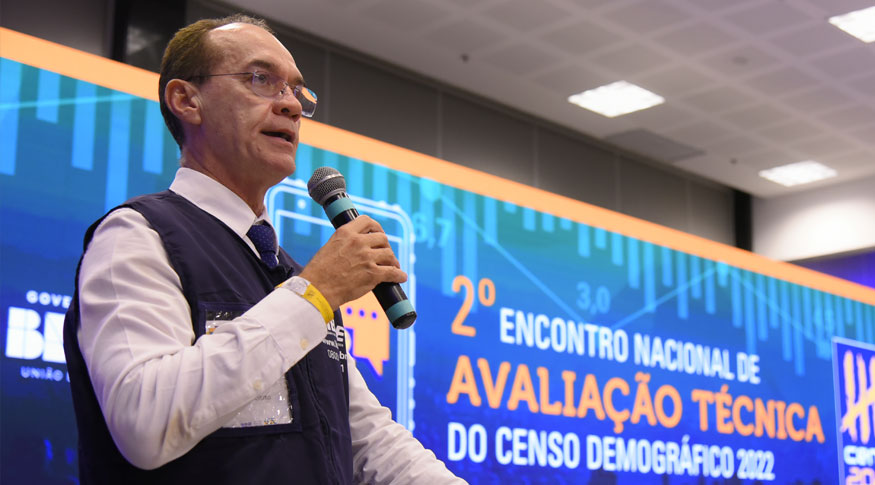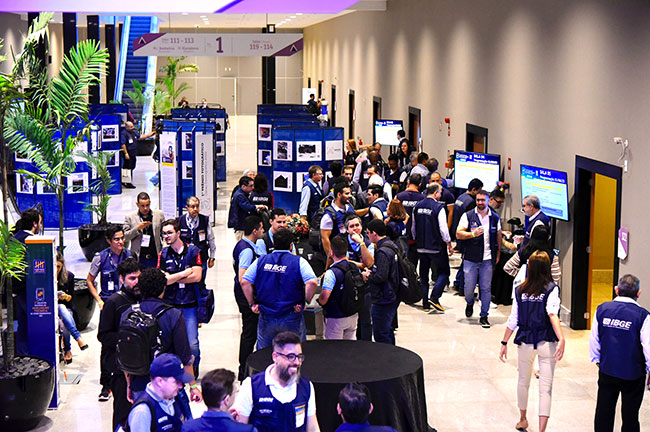
Among representatives from census coordinations of all the 26 states and of the Federal District, state superintendents, area coordinators, members from the IBGE´s Board of Directors and invited persons, more than one thousand IBGE officers gathered in Brasília between July 31 and August 2. They participated in the Second National Meeting of Technical Assessment of the 2022 Population Census at the International Conventions Center of Brazil (CICB), in the federal capital.
Acting President Cimar Azeredo opened the event thanking the presence and support of the collaborators and reminding the difficulties faced by the census operation - such as two postponements (in 2020 and 2021), continuing budget cuts and the coincidence between the electoral period and the data collection (started in August 2022 and completed in May 2023), in a post-pandemic moment. “We had to review processes and directions of the operation in order to hit our major goal: provide the society with a Census of quality and with transparency. And we did it,” highlighted him.
Azeredo also mentioned several formal and informal conversations with technical coordinators in the entire country, which were useful to amend errors and improve the Census, then underway. And highlighted the reason for the event. “What should we do here? More than a technical event, we came here to discuss about lessons learned, we came here to learn and exchange experiences. We need to stress what really worked and where we committed mistakes,” stated him. By the end of his 22-minute speech, Azeredo stressed that everybody were protagonists of the “biggest Census in history.”
Still in the opening session, two representatives of the Ministry of Planning and Budget (MPO) spoke on behalf of Minister Simone Tebet: Sérgio Firpo, Secretary of Monitoring and Assessment of Public Policies and Economic Affairs, and João Villaverde, head of the Special Advisory. Firpo commented about the emotion of that special day for the IBGE. “It is time to celebrate the high level of the work developed,” said him. In his turn, Villaverde congratulated the participants of the meeting and stated that the IBGE “amplifies the voice of Brazilians and makes us smarter, more informed.”
Then, Victor Nunes, Support Manager of the Directorate of Surveys, detailed the project that will record errors and hits of the experiences lived in the 2022 Census and how this action will contribute to a consistent assessment of each step of the survey, as well as reflect on the way of working, local strategies and training of teams for future activities. Then, more than 20 officers were invited to talk about the day by day of the data collection. The team spirit of the IBGE was the strength highlighted by everyone. On the other hand, the criticisms were concentrated on the compensation of enumerators and logistic difficulties, especially the delay in the first payments, still in the beginning of the Census.
In the afternoon, Internal Control and Integrity began to be discussed. Mediated by Willyam Silva, Manager of Integrity, Nelio Machado (Comptroller), Sheila Fonseca (Ombudsman), Carlos Alberto Vianna (Internal Audit) and two members of the Ethics Committee formed the round table: Raissa Madureira and Antonio Caminada. Closing the first day, representatives from The National Union (Assibge) commented not only about the difficulties of the 2022 Census, but also about the next steps to valuate the work of servants.












Presentations, workshops and group meetings take 12 rooms
From the second day onwards, the dynamics of the event was split into workshops, presentations and exclusive meetings, simultaneously taking 12 rooms of the Convention Center, with activities from 8:30 AM to 6 PM. Several subjects were discussed, from Strategic Management of Information and Communication Technology to Collection of Geographical Names, to Risk Management in the IBGE. One of the most crowded workshops was Knowing the PGI (Interactive Geographical Platform), carried out by cartographer Rafael March, of the Directorate of Geosciences. Available free of charge by the IBGE, the PGI allows to consult information in the form of interactive maps, adding layers of interest, downloading divisions and consulting metadata.
On Wednesday (2), President Cimar Azeredo summarized the three days of the meeting, assessed as “extremely positive.” He pointed out all the activities: Exclusive meeting with Census Technical Coordinators; Exclusive meeting with State Superintendents and Deputies; Exclusive meeting with Coordinator of the Post-Enumeration Survey (PPE); Meeting with those responsible for collecting and supervising in Subnormal Agglomerates; Meeting with Supervisors of Information Dissemination; National Address File for Statistical Purposes (CNEFE): advances and next steps; Partnerships: advances and next steps; General Presentation of ICT in the Population Census; Risk Management in the IBGE; Ideas for building a Sustainable IBGE; Team Management Focused on Feedback; Introduction to PPIG - Integrated Production Program in Geosciences; Information and Communication Technology in the IBGE: Today, Perspectives and Challenges; Information Security: challenges in a digital world; Meeting with those responsible for collecting and supervising the Urban Survey of the Surrounding of the Housing Units; Census Planning and Monitoring Meetings (REPACs); Presentation and discussion on disassembling the Census technological structures, repowering of Superintendencies and destination of spare equipment; Geodetics Activities in the IBGE Network; Dissemination of knowledge: Statistical literacy initiatives in the IBGE; Meeting with heads of the Territorial Base Sections of SESs; Budget and Payment; Presentation of ICT Strategic Management - EGTI, PDTI, Digital transformation, Open data, System development methodology, Normative instructions created and RCD on ICT projects; Knowing the PGI - Interactive Geographical Platform; Integrity in IBGE´s day by day; Meeting with teams that worked in PCT localities: first impressions of the data collection; Projects and perspectives for future operations; Discussion about New Perspectives for Attending Users and Required Structure; Interaction between the Territorial Base and the Network and New Products; Moral and sexual harassment - causes and impact; and Collection of Geographical Names.
In the same morning, Izabelle Oliveira, IBGE´s Marketing Coordinator, spoke about the major marketing actions on social media, key to disseminate the Census in its several phases. She explained that the number of IBGE followers in the social media makes it one of the most followed statistical offices in the world.
Junia Quiroga, representative of the United Nations Population Fund (UNFPA), spoke as well. She considered the event Observa Censo a good practice adopted by the IBGE, by bringing to Brazil 80 international observers from 18 countries to follow up the on-site routine of the enumerators. At this time, Guilherme Carneiro do Nascimento, who worked in the Census technical coordination, mentioned about the importance of the Modernization Project of the Statistical and Geoscientific Production. It is an international technical cooperation agreement resulting from a partnership between the IBGE and the Brazilian Cooperation Agency (ABC) with UNFPA.
In a brief testimony, Paula Montagner, Sub-Secretary of Statistics of the Ministry of Labor, stated that she uses the IBGE data and praised the Census work. “The Census figures will allow us to develop labor policies of better quality, reaching every citizen, especially the younger ones,” commented her.
Six representatives from the Ministry of Planning briefly talked about the relevance of the assessment meeting. They were: João Villaverde, head of the Special Advisory; Leany Lemos, Secretary of Planning; Sergio Firpo, Secretary of Monitoring and Assessment of Public Policies and Economic Affairs; Renata Amaral, Secretary of International Affairs and Development; Totó Parente, Secretary of Institutional Articulation; and Paulo Bijos, Secretary of Federal Budget. They handed commemorative plaques to the 27 State Superintendents, recognizing the dedication of their entire team to the success of the operation.
In a relaxed atmosphere, the activities were closed with a pair of officers from the Apucarana and Foz do Iguaçu branches, in Paraná, singing Queen´s “We are the champions” under the applause of the audience. The second part of the National Meeting of Technical Assessment will be held off-site in the next days, aiming at presenting the unfoldings and lessons learned in the meetings and workshops occurred during the on-site event.
Check what invitees and participants of the event said:
Junia Quiroga, Representative from UNFPA (United Nations Population Fund)
"Like other good practices of the IBGE replicated in several countries, an event like this, of assessment and celebration, is a good practice we want to take to more nations.”
Totó Parente, Secretary of Institutional Articulation of the Ministry of Planning and Budget
"You are delivering an unquestionable Census, it was a Census approved unanimously: by the politics, by the media, by all. Congratulations to the IBGE.”
Claudio Barbosa, Census Operations Coordinator
"This event is a celebration of this victory of completing the Population Census. A unique opportunity for the entire technical team, spread along the entire country, to discuss their good practices, to present their work patterns and to establish the improvements for the coming census operations.”
Leonardo Passos, Superintendent in Piauí
"To gather the teams to think strategically about the lessons we can take from this Census is extraordinary. It is also a moment of harmony of the teams to refuel the energies aiming at the next challenges.”
Marcio Minamiguchi, Manager of Population Estimates and Projections
"A rare moment, to be in touch with the network, with the data collection base, to listen to the specificities of our country and to contribute with our knowledge as well.”
Maria Edith Negromonte, Census Administrative Coordinator (PE)
"Beyond all the presentations and assessments, the personal exchange of information is something very rich that we will take back to our superintendencies.”
Isaílda Barros, Area Coordinator (PE)
"Before being numbers, we are persons, we produce numbers. And behind these numbers are a whole set of skills, research and dedication to the IBGE work. Our ability is to show the reality faithfully, the picture of the Brazilian population.”
